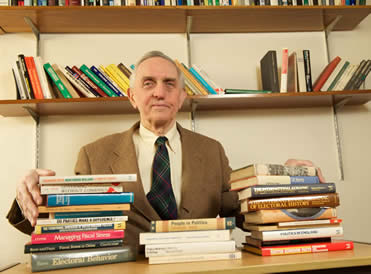PROFESSOR RICHARD ROSE

Richard Rose has pioneered the study of comparative politics and public policy in Europe as Director of the Centre for the Study of Public Policy at the University of Strathclyde, the first public policy institute in a European university. In addition to his professorship at Strathclyde in Glasgow, he is a Visiting Professor at the Wissenschaftszentrum Berlin and the Robert Schuman Centre of the European University Institute, Florence. From these bases he concentrates on the problems of Representing Europeans (OUP, 2015) when there is a democratic surplus in member states and a democratic deficit at the EU level.
Rose has held visiting appointments and fellowships at the Oxford Internet Institute, Cambridge University, Stanford, Johns Hopkins University, Central European University, Chinese University of Hong Kong. He has been a visiting fellow at the Brookings Institution, the American Enterprise Institute and the International Monetary Fund in Washington DC; the Max Planck Institute Berlin; the Paul Lazarsfeld Gesellschaft and the European Centre for Social Policy Research, Vienna; and elsewhere. He was one of the eight founders of the European Consortium for Political Research and of the British Politics Group (APSA)
Initially Rose concentrated on the comparative study of parties and elections. Major books include The International Almanac of Electoral Behaviour and Do Parties Make a Difference? They are complemented by comparative studies of United Kingdom politics, including Politics in England (many editions since 1964); Governing without Consensus: an Irish Perspective and Understanding the United Kingdom.
In public policy, Rose has produced many comparative books, starting with Can Government Go Bankrupt? and Understanding Big Government, and followed by books on public employment, taxation, laws, and inheritance in public policy. Concurrently, he launched the comparative study of political leaders with Presidents and Prime Ministers, The Post-Modern President: The White House Meets the World and The Prime Minister in a Shrinking World. The theoretically informed study the circumstances in which lessons can be learned from other countries was launched with Lesson-Drawing in Time and Space, and followed up by Learning from Comparative Public Policy: a Practical Guide.
After the fall of the Berlin Wall, in 1991 Rose created the New Europe Barometer and New Russia Barometer surveys to monitor mass response to the transformation of no longer Communist societies. In the two decades since, more than 100 trend nationwide sample surveys have been conducted in all ten Central and East European countries that are now member states of the European Union; successor states of Yugoslavia; Belarus, Ukraine and 20 nationwide surveys in Russia. Major comparative books include Democracy and Its Alternatives, Understanding Post-Communist Transformation and on Russia, Elections without Order and Popular Support for an Undemocratic Regime. This research agenda is being followed up by a major study of the Global Experience of Corruption in association with Transparency International Berlin.
Drawing on his journalism experience, Rose has communicated research insights through broadcasting media as an election night commentator on television; as the first bylined political commentator in The Times (London); and through a variety of weeklies, blogs and other media in Britain, Europe and the United States. His writings have been translated into 18 languages and presented at seminars in 45 countries on six continents. Research has been funded by academic and public policy foundations and national science foundations in 13 countries and by intergovernmental organizations such as the European Commission, OECD and the World Bank. For examples of these writings, see www.profrose.eu.
For his achievements, Rose has received honorary doctorates from the European University Institute, Florence, and the University of Orebro, Sweden; lifetime achievement awards from the Political Studies Association of the United Kingdom; the European Consortium for Political Research, and the Policy Studies Organization; and Fellowships of the British Academy, the American Academy for Arts & Sciences, and the Finnish Academy of Sciences and Letters.


